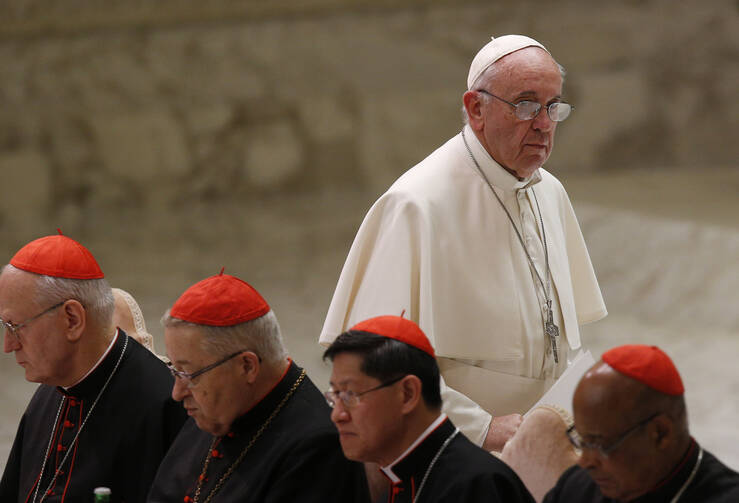Within months of the moment that Jorge Bergoglio stepped out onto the balcony as pope, people began talking about the “Francis Effect,” that is, the positive influence his approach was having on both general morale within the Catholic Church and particular things like vocation numbers or attendance at Mass.
The pope’s effect on spirits has been undeniable—and not just within the church. Indeed, far more than most any of his predecessors, Pope Francis has been embraced by people and faiths around the world as “their pope” for his message of mercy and concern for the poorest and most marginalized of humanity.
But I’d be very surprised to learn that there are now more Americans going to church on a Sunday. (In fact, a recent Pew study suggests exactly the opposite.) Because while we may have had this new inspiring leader for the last two plus years, a lot of other things remain the same. Administratively the church is largely a trickle down organization, changes in direction at the top making their way unevenly down to we in the pews, depending on the reactions of local bishops, pastors and others.
In large part, that’s the fundamental question American Catholics, and I suspect others, have as the Synod on the Family draws to an end—not, “What will the Synod fathers say on issue X or issue Y?”—though that’s obviously important; nor, “Which Cardinals raised a fuss?”—a drama that has captivated elements of the media and some professional Catholics for the last week, and few others; but, “Will the church show the kind of understanding and pastoral respect for the experiences of its members that the pope has?” Is church leadership at a point where it is able to bring its ideas into conversation with the material of people’s actual lives, or will it remain largely detached and seem out of touch?
In point of fact, on many issues that the synod has been discussing, American Catholics have more or less already made up their minds: contraception and remarriage are fine; divorce is something painful that we should help people through, not something we should condemn them for; and a civil form of gay marriage is not a big deal—a position that seems more and more universal among younger people, if still debated among those who are older.
That’s not to say the church shouldn’t offer its own perspectives and challenges. What is the synod if not a moment for the church to offer meaningful theological reflection on issues like love, family, sin and sexuality, and to push Catholics of different cultures to see beyond their own set of assumptions and experiences and appreciate the variety of practices and expectations in our world?
But at this particular moment in the life of our church, especially after all the effort that has been put into consulting with ordinary Catholics, I suspect what most of us in the pews are wondering is less, “What’s the Church’s vision of humanity or human sexuality today?” than, “Did they listen? Do they ‘get it’”?
Is the common sense, pastoral mercy approach of the pope shared more broadly among the hierarchy, or is it mostly just him? When we talk about a ‘Francis Effect’ how far down does that actually extend?
Put another way, when the synod fathers contemplate these important pastoral issues, what place have they made for the question, “Who am I to judge?”








